District 1 Map: Administrative Features, Area, and Population
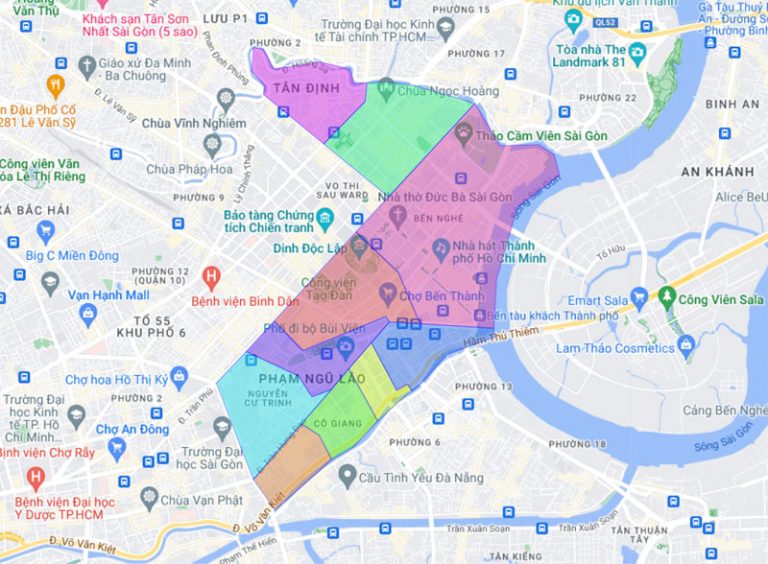
The map of District 1 will provide an overview of the administrative structure of the district, including wards, key locations and transportation networks. It will also offer a clear insight into the geographical and administrative layout of the area, facilitating movement, sightseeing and investment opportunities for business development.
Table of Contents
1. Introducing district 1
District 1 is the economic, cultural and political center of Ho Chi Minh City. The district is home to many famous historical and cultural landmarks, including Ben Thanh Market, the Saigon Notre-Dame Basilica, the Independence Palace, the Central Post Office and Nguyen Hue Walking Street. Additionally, District 1 houses a concentration of the city’s top shopping centers, financial institutions, banks, offices and hotels.
DISTRICT 1 OVERVIEW INFORMATION TABLE
| Category | Details |
|---|---|
| District Name | District 1 |
| Administrative Code | 760 |
| Area | 7.72 km² |
| Population | 205,180 people (updated 2018) |
| Population Density | 29,246 people/km² |
| Number of Wards | 10 |
| Vehicle Registration Plates | 59-T1-T2 |
2. District 1 administrative map
District 1 is the central district of Ho Chi Minh City with 10 wards, each ward possesses its own economic characteristics, bringing outstanding development potential to the whole district.
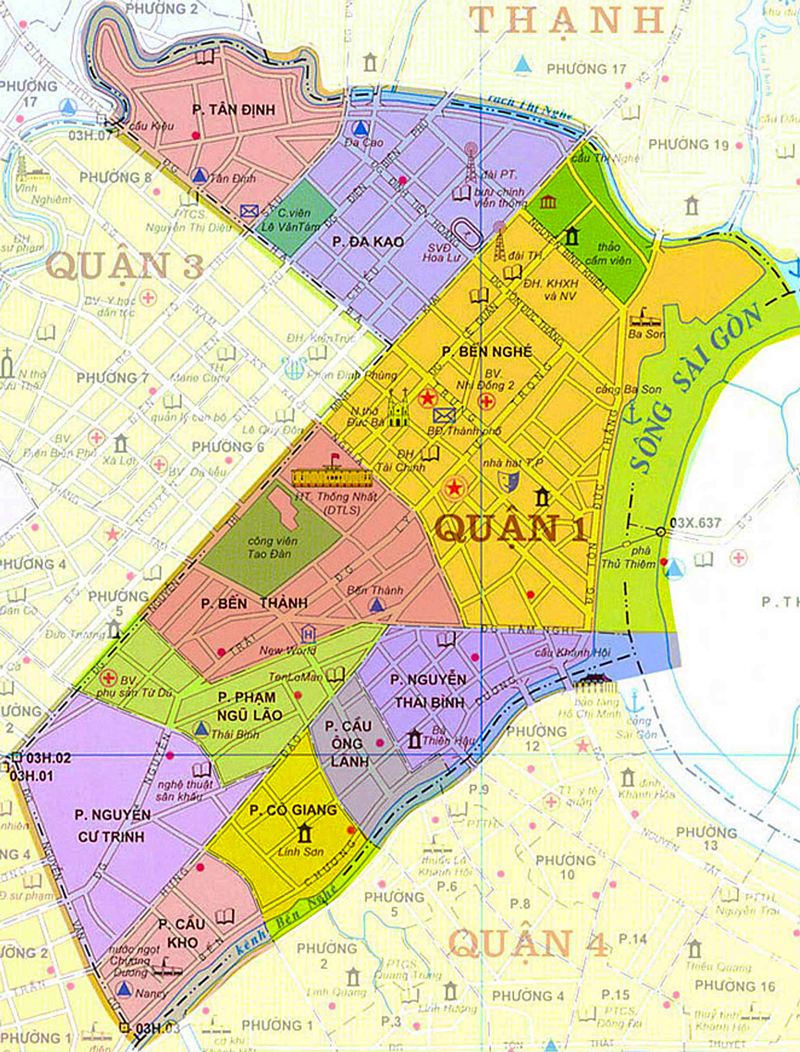
3. District 1 planning map
District 1 planning map was issued in 2020 with the goal of determining the district’s development orientation in the period 2020-2030, with a vision to 2045. Accordingly, District 1 will continue to be the economic and cultural center. culture and politics of Ho Chi Minh City. The district’s key development areas include: trade – services, finance – banking, tourism, culture, education and health.
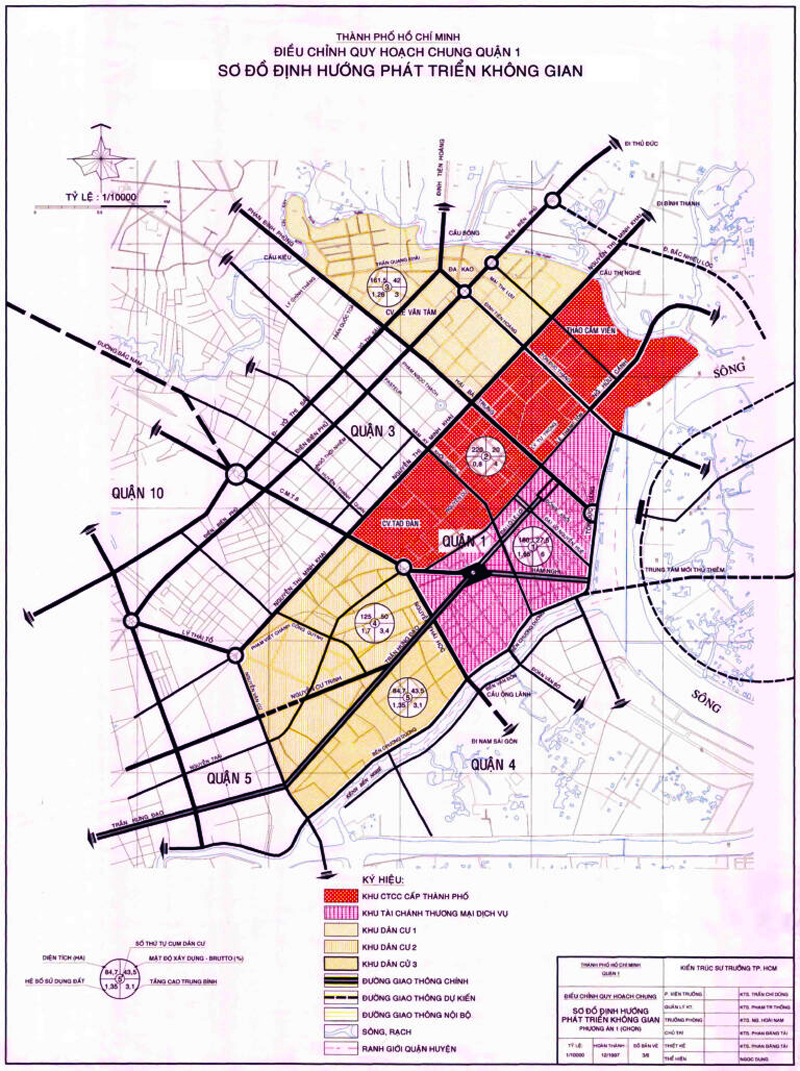
4. District 1 traffic map
District 1 is the area with the highest traffic density in Ho Chi Minh City. The district’s transportation system includes roads, waterways, etc., bringing convenience and speed to the circulation process for residents and tourists.
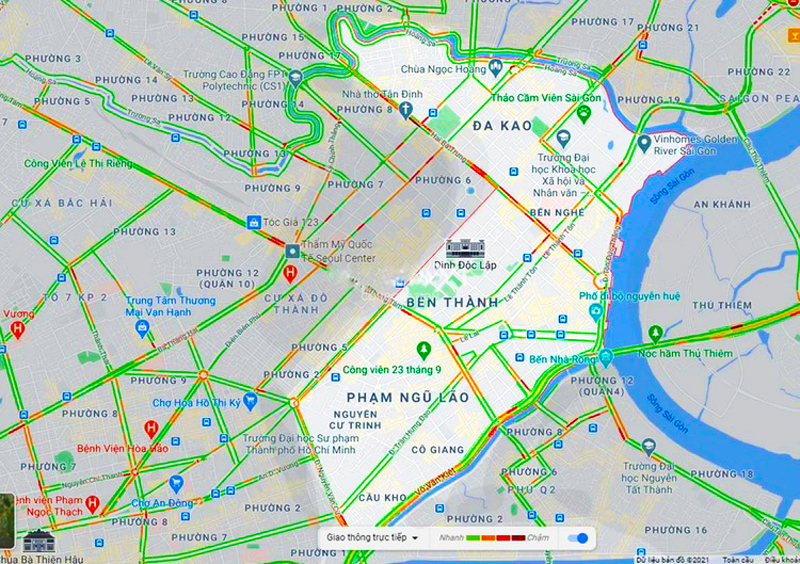
5. Detailed characteristics of District 1
5.1 History of formation
District 1 of Ho Chi Minh City has a long and rich history. It began in the 17th and 18th centuries as a dense forest along the Saigon River and became the administrative, commercial and political center for the French starting in 1859. Since then, District 1 has experienced rapid development, marked by significant infrastructure construction in the 1860s.
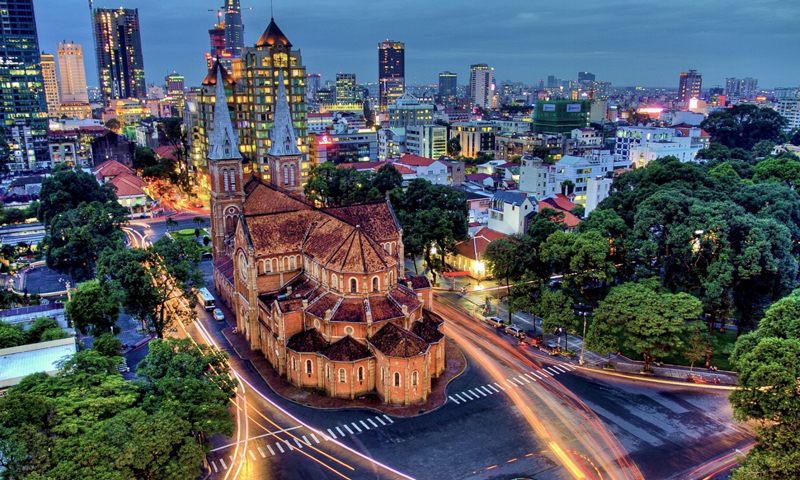
Throughout the war period, District 1 suffered significant impacts; however, since the 1980s, with the implementation of economic reforms, it has transformed into the commercial, financial and tourism hub of the city. Today, District 1 continues to serve as the economic, cultural, political center, featuring modern infrastructure, multi – story buildings and notable tourist attractions and historical monuments.
5.2 Geographical location
District 1 is located in the heart of Ho Chi Minh City, with its area extending across the Saigon Peninsula and along the banks of the Saigon River. This strategic location places District 1 at the center of all economic, cultural and political activities within the city.
Due to its favorable geographic position, District 1 is consistently regarded as the focal point of the urban economy, featuring numerous high-rise buildings, shopping centers, restaurants, hotels and modern service facilities.
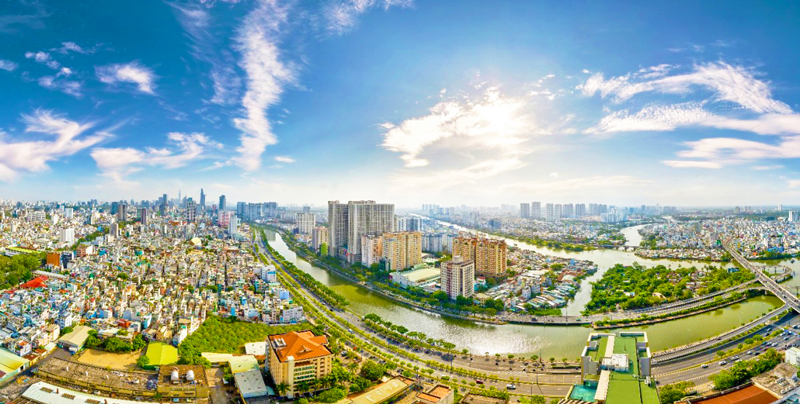
Additionally, District 1 is in close proximity to many famous tourist attractions and significant historical sites, drawing large numbers of visitors and locals each year. This has ensured that District 1 remains one of the most vibrant and rapidly developing areas of the city.
5.3 Area and population
District 1 has a population of approximately 205,180 people, with a high density of up to 29,246 individuals per square kilometer. This makes it one of the most densely populated districts in Ho Chi Minh City. However, the area of the district is only about 7.72 square kilometers, presenting numerous challenges for urban management and sustainable urban development.
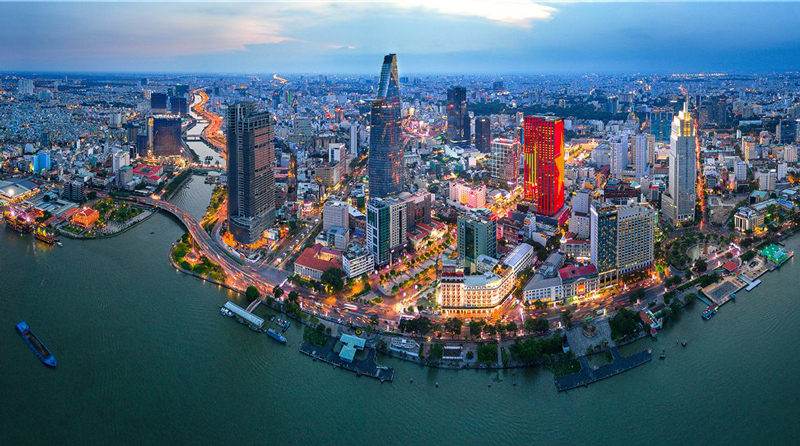
Moreover, the high population density in District 1 places significant pressure on infrastructure and resources. The district consistently faces the challenge of providing adequate infrastructure to meet the needs of its continuously growing urban community. This necessitates stringent and efficient management of land use, transportation, public infrastructure to ensure a conducive, safe and comfortable living and working environment for residents and visitors alike.
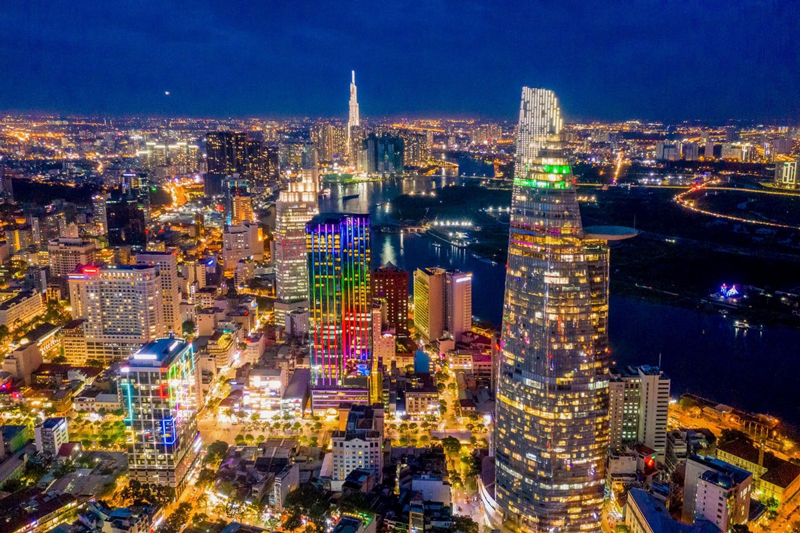
In addition, with its dense population, District 1 becomes the center of many economic, cultural and entertainment activities. Along with that, the district also faces pressure on resource and environmental management to maintain a balance between development and protecting the living environment for the community.
5.4 How many wards does District 1 have?
District 1 is one of the smallest districts in Ho Chi Minh, currently District 1 has a total of 10 wards, including:
- Ben Nghe ward
- Ben Thanh Ward
- Cau Kho Ward
- Cau Ong Lanh Ward
- Co Giang Ward
- Da Kao Ward
- Nguyen Cu Trinh Ward
- Nguyen Thai Binh ward
- Pham Ngu Lao Ward
- Tan Dinh Ward
Wards in District 1 play an important role in the construction and development of the area, while creating the district’s unique cultural and social diversity.
6. Some prominent locations in District 1
District 1 is the central area of Ho Chi Minh City, home to many outstanding locations, attracting domestic and foreign tourists. Below are some prominent locations in District 1:
6.1 Ben Thanh Market
Ben Thanh Market is one of the most famous tourist destinations in Ho Chi Minh City. This is a bustling market with thousands of stalls selling all kinds of items, from clothes, shoes, jewelry to souvenirs and snacks.
6.2 Notre Dame Cathedral
The church was built in Gothic style, with soaring domes and brilliant stained glass windows. Notre Dame Cathedral is a popular tourist destination, attracting millions of visitors each year.
6.3 Independence Palace
It is an important historical site of Vietnam. The palace was built during the French colonial period, was once the residence and working place of the Presidents of the Republic of Vietnam. This is an attractive attraction, giving visitors an insight into Vietnamese history.
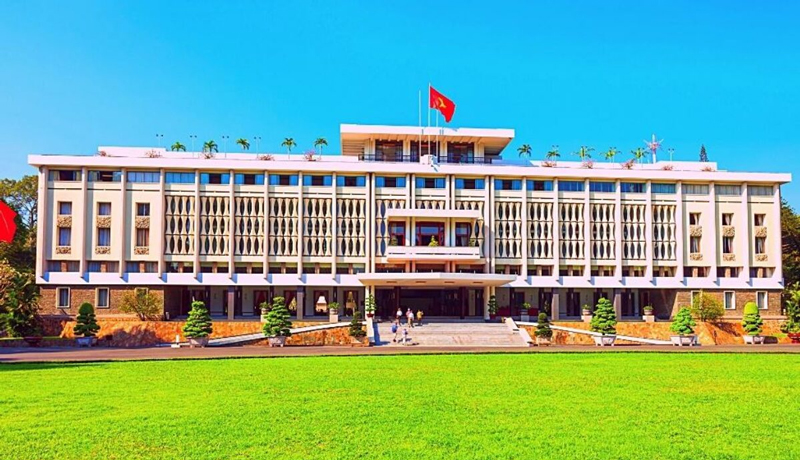
6.4 Nguyen Hue Walking Street
The walking street located in the city center attracts a large number of tourists and locals. Along the walking street are rows of green trees, two modern fountains, shops, restaurants and cafes. Nguyen Hue Walking Street is a great place to stroll, sightsee, shop, eat and participate in entertainment activities.
6.5 City Post Office
The City Post Office is one of the most beautiful architectural works in Vietnam and was once known as the “symbol of Saigon”.
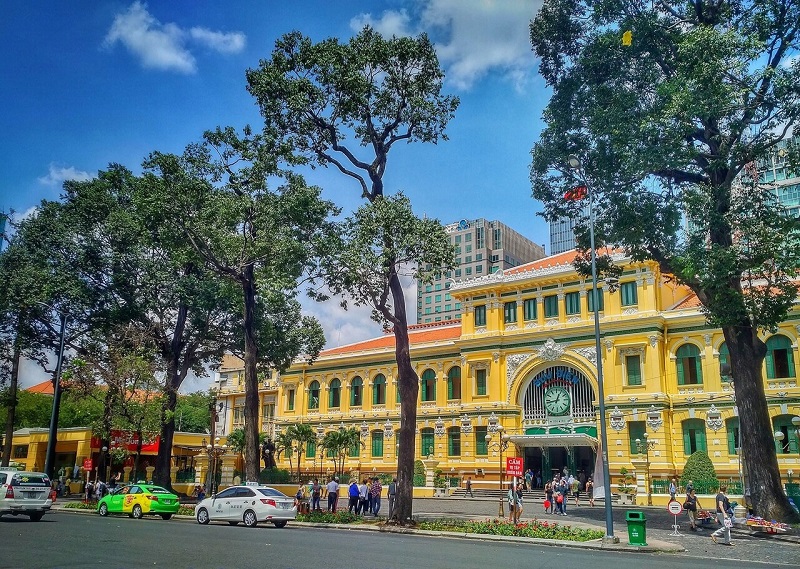
6.6 Ho Chi Minh City Museum
As one of the largest and oldest museums in Vietnam, the Ho Chi Minh City Museum is designed in a classic French architectural style, featuring soaring domes and vibrant stained glass windows. The museum’s unique architecture has attracted the attention of numerous visitors.
6.7 Thu Thiem 2 Bridge
With its modern design and striking artistic lighting, the Thu Thiem 2 Bridge has become a new symbol of Ho Chi Minh City, contributing to the city’s economic and social development and attracting many visitors for photo opportunities.
Additionally, District 1 features several other prominent locations, such as Nguyen Van Binh Book Street, Tao Dan Park, Bach Dang Wharf, ensuring that both locals and tourists enjoy engaging experiences.
7. Location map of District 1 office buildings
District 1 is the economic and financial center of Ho Chi Minh City, renowned for its concentration of premium office rental buildings. Currently, District 1 hosts over 300 office buildings classified as Grade A, B and C, catering to the diverse needs of various businesses.
Outstanding office buildings for rent in District 1:




